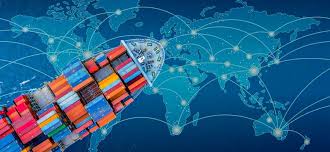
23 Nov Global Trade Explained: Types, Benefits, Challenges, and Solutions

Global trade drives innovation, economic growth, and cultural exchange in today’s interconnected world.
Understanding Global Trade
Global trade, the exchange of goods, services, capital, and technology across international borders, is the backbone of the global economy. It fosters economic growth, creates jobs, and promotes innovation by allowing countries to leverage their unique strengths and comparative advantages. As businesses and nations strive to remain competitive in an interconnected world, understanding the complexities and opportunities of global trade is essential.
What is Global Trade and Why Does It Matter?
Global trade encompasses a broad range of activities, from the physical movement of goods to the transfer of services, technology, and capital. It enables countries to specialize in producing what they are best at, promoting efficiency and resource optimization. Beyond economics, trade encourages cultural exchange, technological transfer, and international cooperation.
Types of Global Trade
- Import and Export:
- The simplest form of trade involves importing goods and services that are unavailable or expensive to produce locally and exporting those that can be produced efficiently.
- Examples: Automobiles, textiles, electronics, and food products.
- Trade in Services:
- Intangible goods like financial services, insurance, education, tourism, and consulting are significant contributors to global trade, bolstered by advances in digital technologies.
- Examples: Online education platforms, tourism packages, and IT consulting services.
- E-commerce and Digital Trade:
- The internet has revolutionized global trade by enabling businesses to reach international markets. Digital platforms simplify the buying and selling process for goods and services.
- Examples: Software services, e-books, and online retail.
- Investment and Capital Flow:
- Capital moves across borders through foreign direct investment (FDI), portfolio investments, and other financial instruments, driving economic development and innovation.
- Examples: Real estate investments, infrastructure funding, and venture capital.
- Commodities Trade:
- Bulk trading of raw materials and basic goods is critical for industries worldwide.
- Examples: Oil, natural gas, metals, agricultural products like wheat and coffee.
- Bilateral and Multilateral Trade:
- Bilateral trade involves agreements between two countries, while multilateral trade is governed by broader agreements involving multiple nations, often facilitated by international organizations.
- Examples: US-Mexico trade agreements (bilateral), WTO agreements (multilateral).
Benefits and Challenges of Global Trade
Benefits:
- Economic Growth: Expands markets, boosts GDP, and drives production.
- Innovation: Exposure to international competition fosters technological advancements.
- Consumer Access: Offers diverse goods and services, often at lower costs.
- Job Creation: Generates employment in production, logistics, and trade-related sectors.
- Cultural Exchange: Promotes global understanding and diversity.
- Technological Transfer: Encourages the spread of advanced practices and tools.
- Stability: Interdependence through trade can enhance political and economic stability.
Challenges:
- Trade Barriers: Tariffs, quotas, and restrictions hinder free trade.
- Sustainability Concerns: Environmental impact from production and transportation.
- Geopolitical Risks: Trade disputes and sanctions can disrupt global supply chains.
- Currency Fluctuations: Exchange rate volatility affects trade costs.
The Role of Financial Institutions in Global Trade
Financial institutions play a pivotal role in facilitating international trade by reducing risks and ensuring smooth transactions. Key instruments include:
- Trade Finance: Provides businesses with funding to manage cash flows and meet trade-related costs.
- Standby Letters of Credit (SBLC): Guarantees payments, ensuring trust between trading partners.
- Bank Guarantees (BG): Mitigates risk by assuring the beneficiary of payment in case of default.
- Project Funding: Supports businesses in scaling operations and integrating new components into their supply chains.
Case Study: Facilitating International Trade with Financial Solutions
Scenario:
A Germany-based company, GmbH Tech Industries, required high-quality electronic components from a Chinese supplier, Shenzhen Electronics Co., Ltd.. The transaction demanded significant funding and financial guarantees.
Solution by Grand City Investment Limited:
- Trade Finance: Enabled GmbH Tech Industries to purchase components without disrupting working capital.
- Standby Letter of Credit (SBLC): Guaranteed payment to Shenzhen Electronics upon fulfillment of contractual terms, reducing risk.
- Bank Guarantee: Provided additional security, ensuring payment obligations were met.
- Project Funding: Supported GmbH Tech Industries in integrating components seamlessly into their production processes.
This collaboration exemplifies how financial institutions like Grand City Investment Limited empower businesses to navigate complex trade transactions.
Emerging Trends in Global Trade
- Sustainability and Green Trade: Increasing emphasis on environmentally friendly practices and carbon-neutral supply chains.
- Blockchain Technology: Enhancing transparency and efficiency in trade finance through decentralized ledgers.
- Artificial Intelligence (AI): Optimizing supply chains and streamlining compliance with global regulations.
- Regionalization: Focus on localizing supply chains to reduce risks from global disruptions.
Conclusion
Global trade is indispensable to the global economy, driving growth, innovation, and cultural exchange. However, navigating its complexities requires expertise and robust financial solutions. Institutions like Grand City Investment Limited play a vital role in facilitating international commerce by offering tailored services such as business loans, trade finance, SBLCs, and project funding.
To explore how we can help your business thrive in the global marketplace, contact us:
 Email: apply@grandcityinvestment.com
Email: apply@grandcityinvestment.com
 Website: www.grandcityinvestment.com
Website: www.grandcityinvestment.com





Sorry, the comment form is closed at this time.